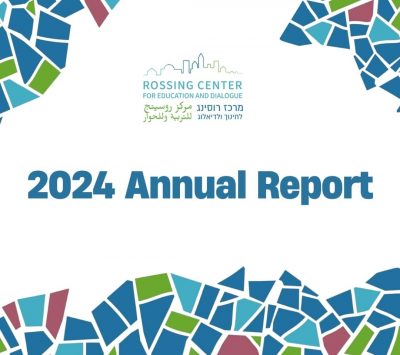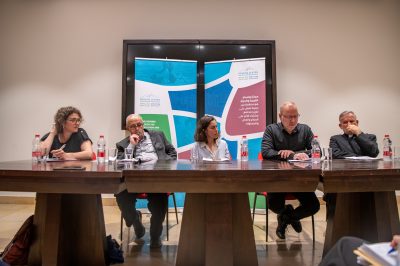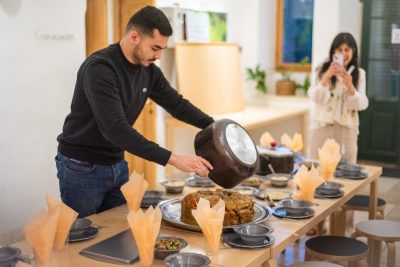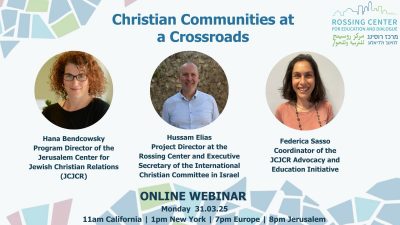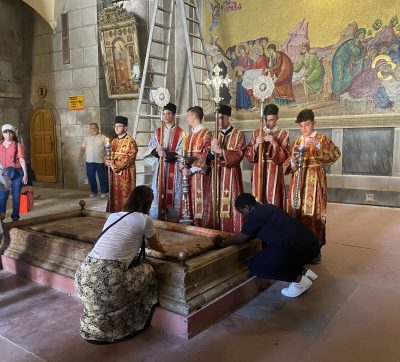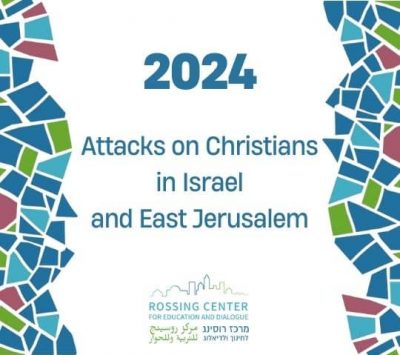By Lorne Anderson
I thought I had a comprehensive handle on interfaith relationships. I had established the Interfaith Project with the Multi-Faith Chaplaincy center at James Cook University, worked as high school chaplain for 4 years and worked with the Tony Blair Faith Foundation as a Faiths Act Fellow. Combined, these experiences lead me to believe that I could work to encourage people from different faiths to a shared space of respect and relationship. And then I spent a summer in Jerusalem…
This summer I have been interning at the Rossing Center for Education and Dialogue, an organization that is working to connect Israelis and Palestinians, Muslims, Christians and Jews, while also developing opportunities for tourists and pilgrims to engage with the multiple complex narratives that exist in Israel and Palestine. Their programs include Healing Hatred initiatives, In-depth multi-religious and geopolitical tours of the Holy Lands, dialogue and education programs and a fair tourism catalogue for tourists to find ethical tour experiences in the region.
My own summer experience with the Rossing Center began with participation in a conference they had organized in conjunction with the International Association for Spiritual Care called, “Healing Hatred: Spiritual Challenges in a Context of Political Conflict”. The conference was a packed three days with speakers like Father Michael Lapsley from the Institute for Healing of Memories in South Africa, through to Dr. Ahmed Abu Tawahina, a psychotherapist who managed to attend from Gaza. The conference was also preceded by a pre-conference study tour to introduce international guests to the complexities of life, faith and politics in Jerusalem. To say that this was an informative experience would be an understatement. During each day of the study tour as well as the conference I found myself becoming more certain that I really did not have anywhere near to a comprehensive understanding of the complexities of my own Christian faith let alone interfaith relationships.

Jerusalem is a complex polygon of perspectives, one that can legitimately be viewed from multiple political and religious narratives and then further broken down within each of the various subgroups. While this in and of itself is not a unique phenomenon and other parts of the world absolutely do have partisan politics and religions complexions, I have not traveled anywhere that has the same emotive desperation as to what I have experienced in Jerusalem. The intensity of religious affiliation with locations and holy sites combined with the intense fear and suspicion that other groups are working to take over and control those spaces makes for a tense environment. Jerusalem’s old city has a fierce status quo that governs how the holy sites such as the Dome of the Rock, Temple Mount and the Western Wall are shared. This same principle is then replicated within groups as various Christian denominations strictly enforce a status quo regarding the control of the Church of the Holy Sepulcher. Peaceful engagement within these spaces is not built upon positive peace and strong relations but compromise.
As I explored these spaces and heard from the people within them I began to realize just how important it is to hear multiple sides of a story. Whilst in Jerusalem I was fortunate to be part of tours that were committed to multiple narratives, I also eavesdropped on tours that silenced perspectives and undermined the stories that challenged any opposing group. Privileging one story above another while silencing other manipulates pilgrims and tourists to very particular interpretations of history, religion and consequent political behavior. Whether pro-Palestine, Pro-Israel or pro-anything else they have the power to coerce how visitors engage in the region. In this way tour guides become some of the most powerful agents in the region, seriously influencing the way that the wider international community responds to the conflict. The consequences of those responses really do have tangible consequences for the people who live in Jerusalem.
As a former chaplain, this experience here in Jerusalem as been exceptionally rewarding. More personally, I have always wanted to illustrate the Biblical stories I often read against the geographical backdrops in which they originated. Enriching my knowledge with the sights, smells and feelings of Israel and Palestine has reinvigorated different areas of my faith and I would wholeheartedly encourage people to come and see this for themselves. However, the reflections on the importance of engaging with, respecting and appreciating the multiple narratives of Jerusalem has also led to some profoundly deep thought about how I approach chaplaincy. Chaplains have a privileged position at Australian Universities. One that requires weaving through the administrative requirements of secular institutions, attempting to be a-political and accessible to all students and faculties, all while remaining true to the fundamental core of our own faith. While Australians navigate the same-sex marriage discussions, deal with attempts to re-define Australia Day and discuss immigration and offshore detention centers, how do chaplains navigate the multiple narratives? As I listened to the narratives embedded within Jerusalem’s streets, I wondered how necessary it was for another Christian to wade in to these discussions, status quos and arguments? Was it right to pick a side to work for their justification? Or was my job as a chaplain to listen, serve and encourage whomever was in front of me. Both affirming the pain that would work to preclude other sides of a story while also encouraging the individual toward a less black-and-white, less dualistic approach to the other sides of their conflict?

By providing a balanced and multi-narrative way to engage with Jerusalem and the Palestinian-Israeli conflict I feel like I have been given license to identify and hear many more details of the real human concerns of those who live here. The Rossing Center has a whole department, ADAShA – The Jerusalem Center for Interreligious Encounter, dedicated to this goal. The Jerusalem Center for Interreligious Encounter provides groups which are interreligious in their composition or in their areas of interest with a serious, systematic and balanced educational experience in Israel. The Project’s innovative programs encourage personal discovery through firsthand experience. Site visits, text-study, lectures, meetings with local religious leaders and visits to local organizations serve as stimuli for far-ranging theological, historical and contemporary discussions amongst the participants. ADAShA (Hebrew and Arabic for “lens”) allows participants to explore their own Christian, Muslim or Jewish roots and gain a deeper understanding of key religious, cultural, spiritual and educational issues in Israeli and Palestinian society. This, along with confronting serious questions about faith, people and nationality in the context of complex regional problems.
I hope that this reflection encourages you both to re-engage with the Israeli-Palestinian region in renewed terms while also encouraging you to listen to different viewpoints in your own societies. For those that are interested in more details about any of the Rossing Center’s programs or about my own experiences please don’t hesitate to reach out for more information.
Rossing Center Director: sarah@rossingcenter.org
Follow the Rossing Center on Facebook
Lorne Anderson: lorneandersonjr@hotmail.com



